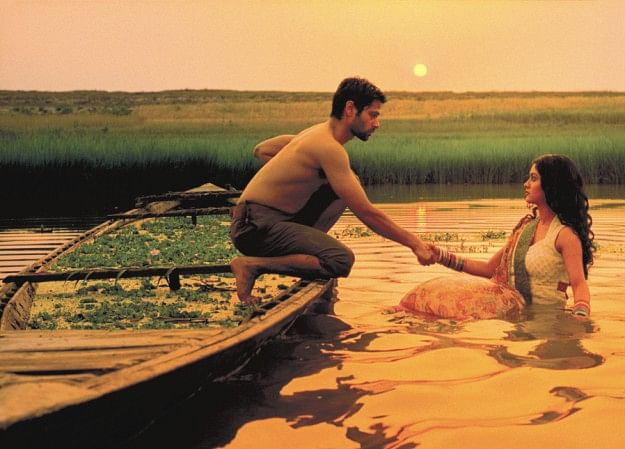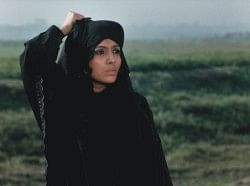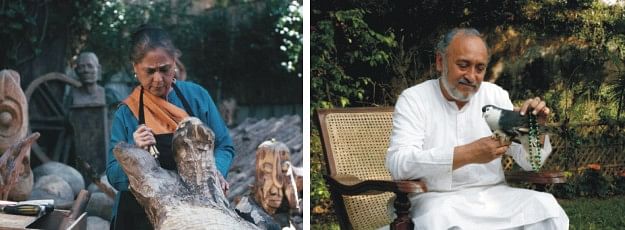|
Film
Meherjaan– A Film
Cluttered with
Controversies
Tamanna Khan
The movie is okay but it has little to do with 1971,” says an eyewitness of the Liberation War of Bangladesh, Azam Pasha, as he comes out from one of the movie theatres at the hub of the city on a weekday afternoon.
Three days after its release, Meherjaan, the subject of much controversy, is running houseful at the Star Cineplex. The reason could either be that the lack of entertainment in Dhaka leaves people with no choice but to watch whatever is screened in the Cineplex halls or that people are just curious about the movie after all the scathing comments it has been receiving.

Omar Rahim as Wasim Khan and Shaina Amin as Young Meher.
Love stories between enemy sides have always proved to be a hit formula in Bollywood flicks. However, the conflict between India and Pakistan cannot be viewed under the same light as that of what happened in Bangladesh in 1971. It was neither a riot in which both sides got equally butchered nor was it a fight over a third territory fought between uniformed men. Rather it was an unplanned uprising and resistance by the mass people and the revolting Bengali armed forces against Pakistani military oppression. In fact, one of the characters in the movie, the Aligarh scholar Khawaja Shaheeb, laudably played by Victor Banerjee correctly terms the war as a fight for the Bengali populace's rights.
 |
Neela |
However that glorious fight remains elusive throughout the movie, which strangely differentiates it from other war-based movies made in Bangladesh. Of course, a war scene is not necessarily a compulsory ingredient, especially when it is justified by the Khawaja's neutral attitude towards the war. As the village head, he takes a strong stance against any kind of action that can lead to bloodshed in his village. And it is only with his demise that the reality of the war finally enters the movie, again raising further questions about his death. At one point it appears that Syeda Rubaiyat Hossain, the twenty-nine year old director, has tried too hard to bring in too many contentious themes in the film.
Nevertheless, Rubaiyat should be given due credit for presenting the audience with a few poetic scenes like that of the opening and the closing one studded with the presence of Jaya Bachchan Bhaduri and her subtle expressions. Unfortunately, the flawless acting of Jaya and Victor from India and Sharmili, Khairul Alam Shabuj and Abul Kalam Azad from Bangladesh has made the work quite difficult for the fresh faces.
Shaina Amin, the younger Meherjaan carries her role well as long as she refrains from delivering any dialogue. The director should have been more careful about the consistency in the use of language. There are various forms of Bengali dialect and it would be acceptable if one form were consistently used throughout the movie. It is true that different dialects can be used by the same person at different situations; but when talking to the same group we tend to use the same dialect.
 |
| Jaya Bachchan as Meher. |
Victor Banerjee as Nanajaan. |
It will be sad to think that the role of Salma, the mentally disabled youngest daughter of the Khawaja, has been used in the movie just to make the audience laugh. Then again even Shakespeare used jokers in his plays to undertone the seriousness of the plot. Yet sitting in 2011, it is difficult to believe that even a mentally disabled person in the 70s would speak in the hybrid Benglish so typical of the present generation.
Strangely again, most of the characters in the film, starting from the main protagonists to the side actors are in love and preoccupied with marriage. Probably, the uncertainty of the war has inspired them to fulfill all the experience that life offers.
When fiction is based on history the responsibility of making it credulous becomes huge. Particularly when it is a sensitive issue like war and crimes committed by oppressive forces. It takes generations to reconcile with the pain of losing a loved one; in the movie Meherjaan does so through her sculptures but Bengalis who lost their limbs, honour and family in the war are not yet ready to forget and forgive.
It is not surprising that Rubaiyat's attempt to portray a different side of the war depicting the love story between a Bengali girl and a runaway Baloch soldier, with no credit at all to Bengali heroism, has stirred up so much criticism, especially from the '71 generation.
Copyright
(R) thedailystar.net 2010 |
